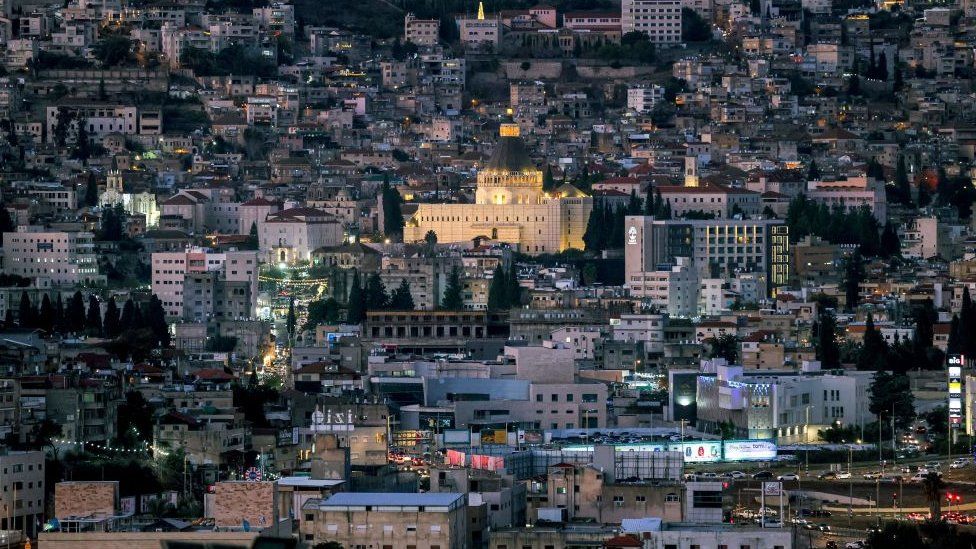
This article is more than
2 year old
Among them is a well-known singer and influencer from Nazareth, Dalal Abu Amneh, who was held in police custody for two days before being released on Wednesday on bail. She's now under house arrest until Monday.
According to her lawyer, Abeer Baker, she was accused of "disruptive behaviour" by police officers, who said her posts could incite violence among her followers.
The post that attracted police attention was an image of the Palestinian flag with the Arabic motto: "There is no victor but God."
Ms Baker says the singer, who is well known across the Arab world for her songs about Palestinian heritage, was expressing a religious sentiment. Israeli authorities interpreted the singer's post as a call to arms for Palestinians.
Since the start of the war between Israel and Hamas, police in Israel have adopted what they call a "zero tolerance policy" towards social media activity deemed to express support for Hamas, an Islamist group which is committed to the destruction of Israel and designated as a terrorist group by Israel, as well as the US, UK, and many other countries.
Ms Abu Amneh is one of dozens of Arab citizens of Israel arrested in connection with social media posts about the war.
Many others have been suspended or sacked from their jobs or face disciplinary action from their universities.
Israeli Arabs - many of whom prefer to be called Palestinian citizens of Israel - make up a fifth of the country's population.
Since Hamas's attack, police say they have investigated and detained more than 100 people for their social media activity. Sixty-three have been arrested and questioned in Jerusalem alone.
"Anyone inciting against the State of Israel, its government symbols, elected officials, military personnel and police, should be aware that the Israel Police will respond firmly and without leniency," said Israel's Police Commissioner, Yaakov Shabtai, at a meeting with senior leaders this week.
Adalah, the Legal Centre for Arab Minority Rights in Israel, believes the number of detained is higher as more arrests have been made recently.
By comparison, during the Israel-Gaza conflict in May 2021, only 16 people - 15 of whom were Arab - were charged with inciting violence, according to a report released by Adalah.
Human rights activists worry this spike in detentions is due to the police adopting a wider interpretation of what constitutes incitement to violence.
In the Bedouin city of Rahat, for example, police have detained a former mayoral candidate, Dr Amer al-Huzail, who shared on social media a map of the Gaza Strip with an analysis of possible scenarios for an expected ground operation by Israeli forces.
This has led him to be accused of aiding the enemy in a time of war.
But even when no criminal charges are filed, some people in Israel are still facing heavy consequences for their social media activity.
Lawyers working for Adalah say they have received more than 40 cases of Israeli Arab workers suspended or fired from their workplaces overnight.
"People are getting their livelihood threatened sometimes just for liking a post," says Salam Irsheid, a lawyer at the organisation. "We even have a case of a worker who is at risk of being fired for liking a news report on the situation in Gaza on social media."
Arab students in Israel are also facing disciplinary actions from their universities.
Last week, Ariel Porat, the president of Tel Aviv University, said that a few students had been flagged for expressing "support for the atrocities of Hamas".
"We will be very strict with this handful of students," he wrote in a statement on the university's website, "and when we feel the offence is criminal in nature, we shall report them to the police. We will act swiftly, as required in this sensitive situation, but will not deny any student the right to a fair investigation."
Lawyers from Adalah say they have received complaints from 83 students who have been suspended from schools across the country and, in some cases, told to leave their accommodation at short notice.
"None of the cases are about actions, demonstrations or participating in illegal things. They're all about posts on social media," says Dr Hassan Jabareen, the general director of Adalah.
"More than 90% of the posts are clearly against the war, against Israel's actions in Gaza, supporting the victims of war in Gaza," he adds.
"Ten percent of the posts fall in a vague area that may be interpreted as indirectly supporting the acts of Hamas against civilians.
"In normal times, they wouldn't be interpreted like that, but these days Israel tends to give the harshest interpretation to these posts."

Public outrage at the attack by Hamas, which killed more than 1,400 people, mostly civilians, in areas near the Gaza Strip, has also led to anger at Jewish Israeli voices calling for de-escalation.
Last Sunday, a prominent left-wing ultra-Orthodox Jewish journalist, Israel Frey, had to be escorted by police away from his home in Tel Aviv for his own protection.
Protesters had gathered outside the building and shot flares at his apartment after he posted on social media a video where he was praying for civilians in Gaza.
And on Wednesday, Ofer Cassif, a Jewish lawmaker for the Arab-led Hadash-Taal alliance, was suspended from the Israeli parliament for 45 days after he strongly condemned the bombing of Gaza.
In one of his most recent posts on X, formerly known as Twitter, he criticised the police who, he said, hadn't intervened promptly in Mr Frey's defence.
"Armed police forces are sent to arrest anyone who shows a trace of empathy for the massacres in Gaza," he wrote.
"But the police have no desire to protect a left-wing journalist whose life is in danger."